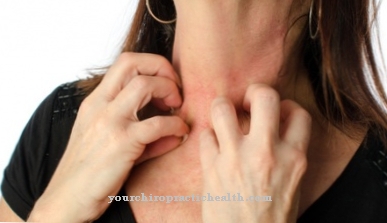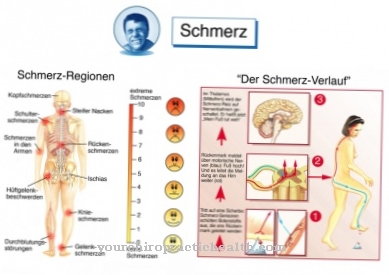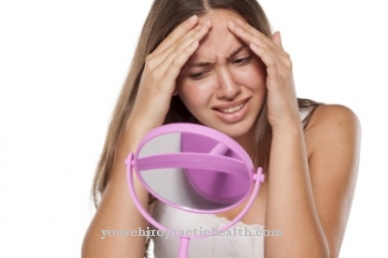Many people are familiar with the problem: after washing their hair in the morning, the hair looks stringy or greasy again after a few hours. One feels accordingly unkempt and unhygienic. Reasons for inclination to oily hair there are very many.
What is oily hair?

Oily hair is expressed in mostly unsightly, greasy, shiny strands. The reason for this is an increased production of sebum, which is passed on to the hair by the sebum glands on the scalp.
If the production of these glands is too high, the hair becomes greasy and unsightly to look at more quickly. With correspondingly low sebum production, on the other hand, the opposite of greasy hair, brittle or brittle hair, occurs.
causes
Oily hair can be caused by many different factors. A first reason is hereditary predisposition. Some people simply produce sebum faster than others, or they simply have a higher number of sebum glands on their scalp.
Unfortunately, there is little that can be done about this cause. Another reason for the tendency to have greasy hair is stress. Those who are frequently exposed to stress tend to produce higher levels of sebum than people who feel exposed to comparatively less stress. Hormonal changes can also be the reason for increased sebum production on the scalp.
This includes, for example, puberty. In women, pregnancy can also significantly increase sebum production. Fine hair also looks greasy faster than very thick hair, since the same amount of sebum is distributed over a smaller number of hairs and a visible effect occurs more quickly.
Diseases with this symptom
- acne
- Hair root inflammation
- Menopause
- Parkinson's
- Hormonal imbalances
- Seborrhea
Diagnosis & course
A hairdresser or a dermatologist can best tell you whether you also tend to develop oily hair. By examining the scalp, it can give you information about whether your sebum glands are overly active.
If you have a tendency to oily hair, dermatologists usually recommend not washing your hair at all for a few days so that the scalp can recover - this can be very uncomfortable for the patient at first, but is worthwhile in the long term because of the sebum production decreases sharply with less frequent washing.
Complications
When naming the complication, the entire health disorder should be included. From a medical point of view, a complication is a symptom of a disorder or the side effect of a medical preparation if it was used against this disorder. Complications may arise in the absence of treatment or in the course of treatment. Oily hair is actually not a complication of an illness, but rather a side effect of hormonally-related overproduction of wool fat during puberty or menopause.
Oily hair may be a harbinger of this hormonal transition. With age, the wool fat production declines, which tends to cause hair to become too dry. Too infrequent, but also too frequent, hair washing causes greasy hair. The use of excessively degreasing shampoos can also be the cause of greasy hair, as the increased oil production protects the skin against the resulting skin irritation. However, easily oily hair is also a sign of healthy hair growth. Since this is not really a sign of illness, there is no need for a medical examination or treatment.
A healthy diet and avoidance of excessive consumption of sweets, alcohol and cigarette smoke protect the skin and can thus better regulate the wool fat production in the scalp. Regular skin care, the choice of shampoo depending on the hair type and regular changing of the pillowcase also help.
When should you go to the doctor?
Oily hair is not a health problem, but a cosmetic problem. Nevertheless, it can be helpful for those affected to see a doctor. Because a cosmetic problem can turn into a psychological burden. If you are forced to wash your hair daily or even several times a day, you should consult your family doctor.
In fact, a mixed up hormonal balance (through puberty or menopause) can be the cause that can be treated medically. To do this, it is first necessary to control the level of hormones. This can be done by giving urine or blood. If it turns out that the ambitious sebum production of the scalp has hormonal causes, further treatments can be agreed. For example, women who use contraception can receive a different preparation after consulting their gynecologist.
In addition to oily hair, other symptoms may indicate that a doctor's visit is necessary: Acne and oily skin are signs of a hormonal cause. In addition, various failed attempts in the past to solve the problem are reason enough to consult with the doctor. These attempts include the use of special shampoos, fewer hair washes per week or various home remedies (hair washing with rye flour, dry shampoo). In order to prevent psychological consequences, an effective treatment by the doctor should be considered.
Doctors & therapists in your area
Treatment & Therapy
There are many ways to treat oily hair. First of all, you can wash out the fat. As already said, frequent washing is one of the reasons why so much sebum is produced in the first place.
It is therefore advisable to wash your hair in the morning rather than in the evening, as the sebum glands are most active at night. When washing, only lukewarm water should be used, and air that is too hot should not be used when blow-drying. The heat stimulates the scalp and thus ensures increased sebum production. A targeted head massage can also help to get rid of the sebum. The massage presses this out of the pores, so the skin has less sebum available.
The hair should also not be brushed during the day, as this distributes the fat at the hair roots in the hair. It is also recommended to use baby powder, which can absorb the fat. Healing clay can also have a similar effect. The use of dry shampoo also helps.
Many people have the feeling that the hair is not cleaned properly because there is no water, but this is not the case. Cold tea, converted into a hair conditioner, can also be effective against oily hair.
Outlook & forecast
Oily hair is usually found in people who take little care of their personal hygiene. Therefore, a visit to the doctor is not absolutely necessary with oily hair. The symptom can also be removed again with simple means. If the person does not do anything about their oily hair, the problem will not improve on its own. This poor hygiene can also have a negative impact on the scalp, which can lead to inflammation and other diseases.
Getting rid of oily hair is very easy, however. To do this, the hair just needs to be washed a little more often with a mild and gentle shampoo. When washing, it is important to ensure that the hair is not washed too often, because this will damage the natural protective layer of the hair and make it greasy more quickly. Here an optimal rhythm has to be found in which the hair is washed. Usually it is every second or third day when washing with shampoo.
With regular and good hygiene, in most cases there is a positive course of the symptom and the greasy hair disappears. Only in rare cases does the person concerned then have to see a doctor about this problem.
prevention
Home remedies ↵ for oily hair To prevent greasy hair, it is also advisable not to use hair conditioners, as these are more suitable for dry or strawy hair. Shampoos with silicone as an ingredient should also be avoided. Shampoo for oily hair should also not contain oils, essences or similar substances.
Ultimately, you should avoid washing your hair every day. In the beginning, the hair may look even greasier, but in the long term the body's sebum production is reduced and the hair no longer has to be washed as often as it used to.
You can do that yourself
Oily hair can usually be treated very easily; this symptom does not require a visit to the doctor. They are usually a sign of poor hygiene and can be treated with more frequent hair washing. A shampoo should be selected here that does not make the hair greasy quickly and ideally also works without silicone. The hair is spared when washing and therefore does not grease so quickly.
Under certain circumstances, hair gels or hairsprays can be the reason for the oily hair. Those who use these products should possibly do without them. There are also many products that contain wax and so do not make the hair greasy as quickly.
However, oily hair can also develop if the patient washes the hair too often. You then grease faster because the natural fat layer is washed off too often. Washing your hair less often helps here. This can seem uncomfortable in the first few days, but the hair improves after a few days. The distance can be continuously increased here in order to get the hair used to it.
























.jpg)



